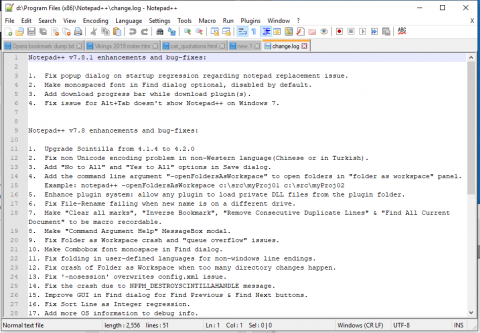I’ve been using Notepad++ as one of my text editor options for a long time. It’s a very useful tool, and I heartily commend it to anyone needing a Windows text editor that can do a lot more than just edit text. I hadn’t downloaded the most recent version, so I was unaware that the developer was under attack from Chinese government supporters for his explicit designation of version 7.8.1 as the Free Uyghur edition:
On Tuesday, Don HO, the developer of Notepad++, a free GPL source code editor and notepad application for Microsoft Windows, released version 7.8.1, prompting a social media firestorm and a distributed denial of service attack.
Notepad++ v7.8.1 was designated “the Free Uyghur edition,” in reference to the predominantly Muslim ethnic group in western China that faces ongoing human rights violations and persecution at the hands of Beijing.
“The site notepad-plus-plus.org has suffered DDoS attack from 1230 to 1330 Paris time,” HO said in an email to The Register. “I saw the [reduced] amount of visitors via Google analytics then the support of my host confirmed the attack. The DDoS attack has been stopped by an anti-DDoS service provided by our host [Cloudflare].”
Previous politically-themed Notepad++ releases have focused on Tiananmen Square and the terrorist attack on French satirical publication Charlie Hebdo.
A post on the project’s website explains HO’s decision to criticize the Chinese government, something companies with business interests in China generally try not to do for fear of retribution.
From the Notepad++ website:
Human rights in China is always a hotly contested topic. Since 2017, numerous reports have emerged of the Uyghur people being detained in extrajudicial “re-education camps”, subjected to political indoctrination, and sometimes even torture. 2018 estimates place the number of detainees in the hundreds of thousands.
The Uyghurs are not ethnically Chinese but live in China’s so-called autonomous Xinjiang region. The region’s name suggests the Uyghurs have autonomy and self-governance. But similarly to Tibet, Xinjiang is a tightly controlled region of China. After the recent Xinjiang conflict, Beijing has recast the Uyghur ethnic group as a terrorist collective. This has allowed Beijing to justify its transformation of Xinjiang into a surveillance state. There has also been a marked rise of Islamophobia across China.
At least 120,000 members of Kashgar’s Muslim Uyghur minority have been detained in Xinjiang’s re-education camps which aim to change the political thinking of detainees, their identities, and their religious beliefs. Reports from the World Uyghur Congress submitted to the United Nations in July 2018 suggest that 1 million Uyghurs are currently being held in the re-education camps.




